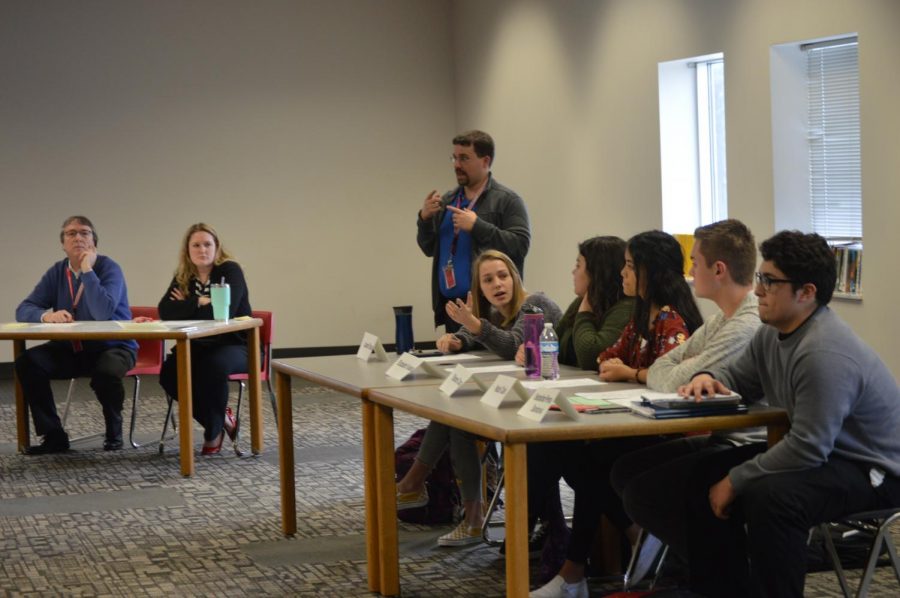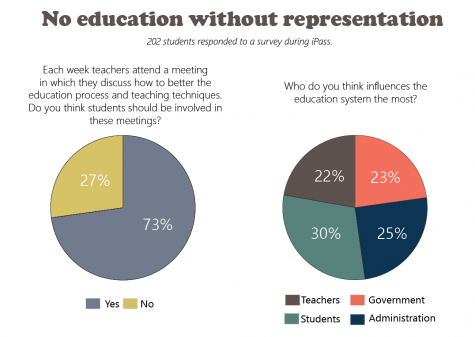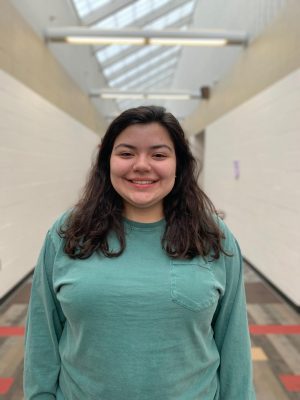Open for discussion
Profession development meetings led by students help gain new perspective
Teachers filled the tables for their Wednesday professional development in rooms 267 and 240. They took notes and talked quietly with those around them. But this time, it wasn’t the master teachers or administrators they were listening to. It was a panel of student leaders.
In an effort to discuss the effectiveness of certain teaching styles, principal Brian Knight brought in a group of students to lead the professional development meetings on Feb. 27. He hoped the students would help the teachers think about their instruction in a new way.
“It gives a good perspective from their point of view of what’s beneficial, and then secondly, it really aligns to the work we’ve been doing,” Knight said.
According to Knight, the student leaders were chosen from AP and advanced classes as well as clubs and other organizations. He says he is trying to have the group represent the SHS student population as a whole.
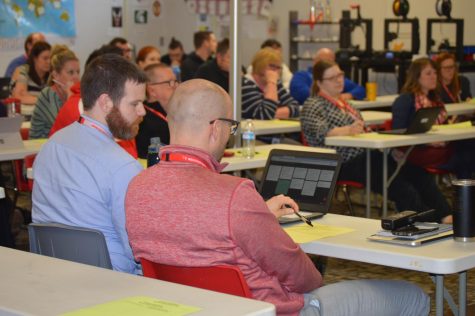
Principal Brian Knight and master teacher Chris Finkhouse monitor a Padlet that teachers post questions to for the student panel.
Knight has been working with the student leaders for a year and a half now. He has been leading meetings and listening to their perspectives over topics such as in-class activities and lesson plans.
During these meetings, the students have been looking over the teachers’ rubrics and talking with the master teachers.
“When we started asking those questions about what creates a really good learning experience…, (the students) were giving us really good feedback,” Knight said. “They were giving us feedback on stuff we’ve been trying to work on the past couple of years in the professional development meetings.”
During the meeting, the master teachers led questions over the students’ education and teachers’ instruction styles, which were topics that were introduced during student leader meetings. Students then shared their opinions and ideas over these.
Senior and student leader Liz Lamkin was grateful for this opportunity, and she believes that it is important for teachers to take advantage of it.
“I think that they just needed a different perspective,” Lamkin said. “I think that it was necessary for teachers, instead of teachers telling teachers what to do all the time. Bringing students in… kind of gives them insight on what they’re doing well.”
Master teacher Josef Horvath says that including students is a smart choice. He thinks that teachers should appreciate this unique opportunity.
“A lot of times, the teachers only hear from (master teachers) as instructional coaches or from the administration team or just from each other,” Horvath said. “But, we don’t really have the opportunity to get feedback from students.”
According to Horvath, students’ opinions are very important.
“The students are who we’re here for,” Horvath said. “We’re not here for anything else other than educating the students to make them successful, to create independent thinkers. So, if that’s the case, we really should be listening to what our students have to say. ”
Junior Toby Brummett, who is not part of the group, is one student that finds some fault in this. He feels that the teachers should not only hear from advanced students, but other types of learners as well.
“I think it’s a good thing if all students are represented and not just student leaders and people in high ability classes,” Brummett said.
Student leaders are not the only ones who can get involved. Sophomore and student leader Casey Rockel says that it can’t hurt to give nice suggestions or speak out when a particular student needs help.
“(Students) can always go up to a teacher and ask for help, maybe have a suggestion for them, and always be respectful to them,” Rockel said. “Those are probably the best ways to make a difference.”
Spanish teacher Jamie Marshall is very thankful for the feedback the students provided. She thinks it is very beneficial to receive feedback and to learn how to improve in the best interest of the students.
“I think it’s fantastic that students are attending our PD meetings,” Marshall said. “(The students) are bringing feedback to us. Feedback that helps us to know if the instruction that we’re giving you is beneficial, useful, helpful, informative.”
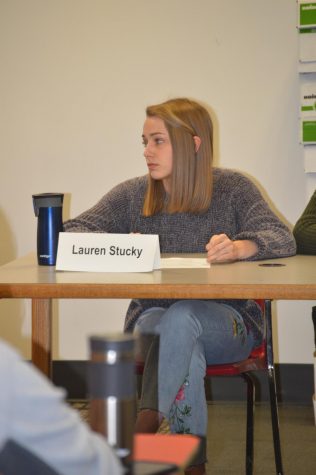
Senior Lauren Stucky speaks during the student panel discussion. She believes teachers’ passions can influence their lessons.
Math teacher Jack Williams was very excited for the meeting and says his eyes were opened to new ideas. However, he says that it would’ve been very helpful to be reminded about this special meeting. The teachers were told, but some did not remember and could have benefitted from a reminder.
“I think the whole thing kind of caught some people off-guard,” Williams said. “Even when I walked in there, I was like ‘What is going on?’ at first.”
Senior and student leader Lauren Stucky had big plans for the meeting and many talking points planned out. Her main focus was how teachers’ passion affects students and their learning.
“I think it just makes it a little bit more real for them,” Stucky said. “It’s cool for them to realize what they’re being told in the meetings is actually what we think too. It’s cool for them to hear what an impact they could potentially make on us.”
Teachers and student leaders claim to have taken some useful lessons away from this meeting. Although, some have ideas for improvements that could be made in upcoming years.
“Honestly, we kind of just ran out of time a little bit,” Stucky said. If they were to do this again, I think that they would maybe have to break us up into smaller groups, not have us talk to so many teachers. Have it be more discussion-based.”
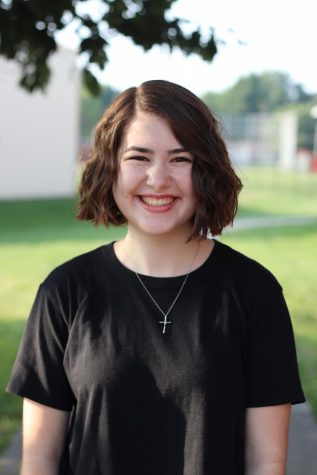
Hi! My name is Emma Herwehe, and I am a senior at SHS. This is my third year on staff with The Journal. I am the Content Managing Editor this year. I am...


